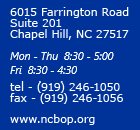This is a publishing platform for Pharmacy Students from Campbell University and The University of North Carolina at Chapel Hill of projects completed while on an experience rotation with the North Carolina Pharmacy Board.
--------------------------------------------------------------------------------
Drug Diversion Pocket-Card
by Emily Heil, University of North Carolina at Chapel Hill Eshelman School of Pharmacy Pharm.D. Candidate, Class of 2009
Guide for Proper Disposal of Medication
also by Emily Heil, University of North Carolina at Chapel Hill Eshelman School of Pharmacy Pharm.D. Candidate, Class of 2009
--------------------------------------------------------------------------------
Gender Detriments in Health Plan Benefits
by Anna C. Naples, Pharm. D. Candidate, UNC-CH Class of 2003
A study was conducted on benefits paid by six popular health plans in North Carolina on 10 prescription drugs, five commonly used by females and five commonly used by males. By at least one measure five of the six plans provided better benefits on drugs used by males than drugs used by females from this group.
--------------------------------------------------------------------------------
The Role of Patient Counseling in Preventing Medication Errors: Significance of Graduation Date
by Stephen Andrew Mitchener, Pharm. D. Candidate, UNC-CH Class of 2003
This paper examines dispensing errors which led to actions by the Board of Pharmacy over the last three years. Among other things it established that most dispensing errors that were preventable by patient counseling were committed by pharmacists who graduated prior to 1993 when the patient counseling rule was implemented. This also indirectly confirms the benefit of a school curricula change which began to emphasize patient counseling in 1993.
--------------------------------------------------------------------------------
North Carolina Drug Related Death Reports
by Alicia Cullen, Pharm.D. Candidate, University of Arkansas for Medical Sciences
Results available from the Board's rule on reporting drug related deaths indicate controlled substances are not main cause of deaths in Health Care. A nine year study by the North Carolina Pharmacy Board reveals that 85% of deaths due to drugs used in health care comes from regular prescription drugs and not controlled substances. The largest single cause of deaths are the anti-coagulation drugs such as Warfarin and Heparin. At the end of the report is an alphabetical list of Death Summary Drug Devices.
*UPDATE* North Carolina Drug Related Death Reports
by Meredith Smith, Pharm.D. Candidate, UNC-CH Class of 2005
--------------------------------------------------------------------------------
Nuts and Bolts Pocket Guide to Pharmacy Law (Controlled Substances)
by Chris Peoples, Pharm.D. Candidate, Campbell University Class of 2003
Members of the Board of Pharmacy expressed an interest in obtaining a pocket card with the “nuts and bolts” of pharmacy law for their reference. During March 2003 Chris Peoples assembled the card's text. (Text revised May 2008; October 2009; November 2010; May 2012; February 2013; November 2013; November 2017; June 2020; July 2021).
--------------------------------------------------------------------------------
A Plan for Pharmacist-Managers to follow in Case of a Natural Disaster
by Tsz Yin (Jeremy) So, Pharm. D. Candidate, UNC-CH School of Pharmacy Class of 2005
In the state of North Carolina, thousands of dollars are lost each year due to natural disasters such as hurricanes. One should remember the devastating damages that were caused by Hurricanes Floyd and Hugo a few years ago. It is impossible to prevent the occurrence of these natural disasters, but pharmacists as health care professionals can develop some contingency plans to safeguard the health and wellness of North Carolinians.
Board Rule 21 NCAC 46.2502(j) states that the "pharmacist-manager shall prepare a plan to safeguard prescription records and pharmaceuticals in the event of a natural disaster such as hurricane or flood." The Board often receives questions in regard to the specificity of this "plan". The document above is not intended as a Board Rule but a compilation of information from various sources. Each pharmacist-manager should develop a plan that is specific to the setting of his or her practice.



